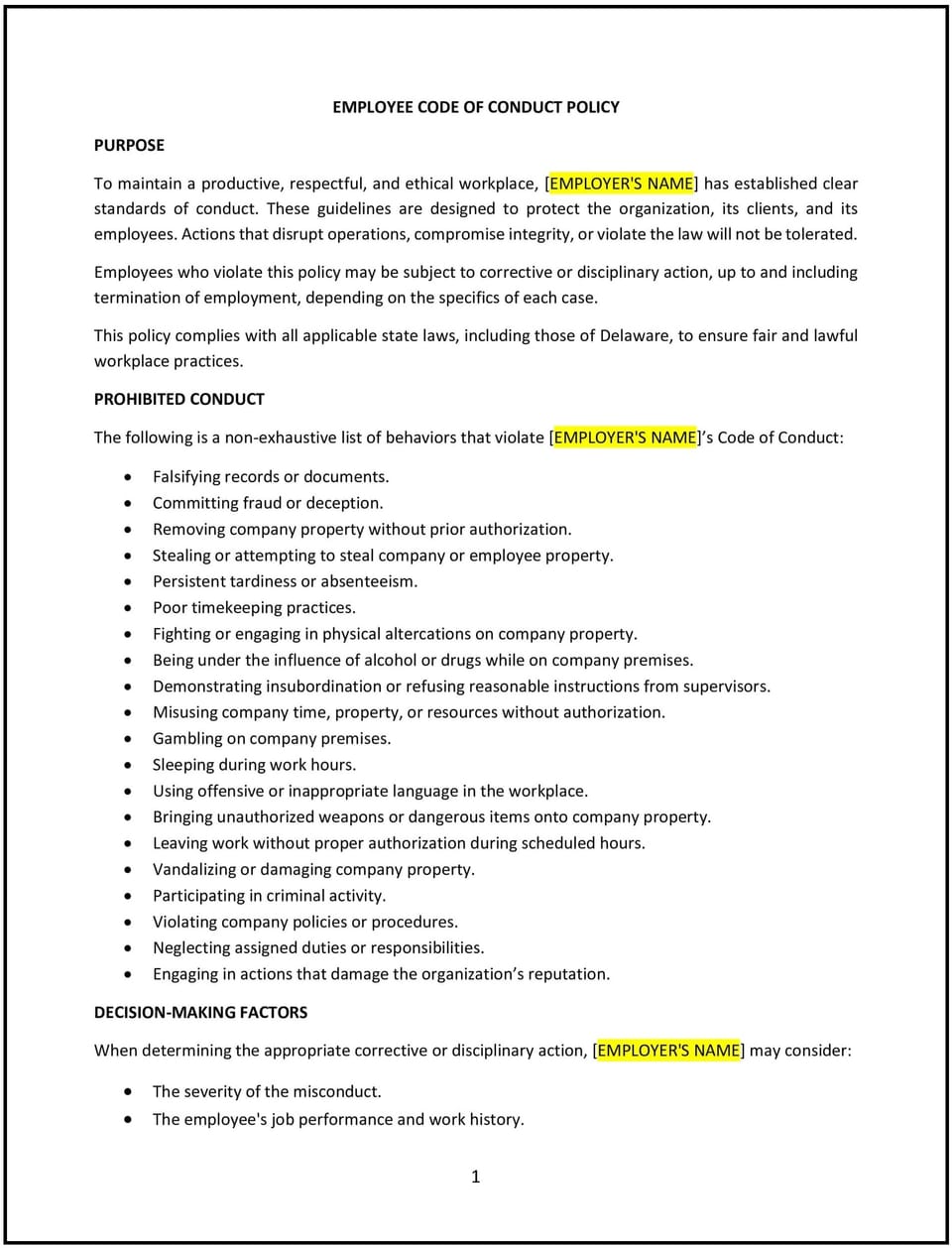Standards of conduct policy (Delaware): Free template

Standards of conduct policy (Delaware)
A standards of conduct policy helps Delaware businesses establish clear expectations for employee behavior and professional conduct. This policy outlines guidelines for workplace behavior, ethical standards, and disciplinary measures to foster a respectful and productive work environment.
By implementing this policy, businesses can promote accountability, minimize conflicts, and ensure compliance with Delaware and federal labor laws.
How to use this standards of conduct policy (Delaware)
- Define expected behaviors: Specify professional conduct standards, such as respect for colleagues, adherence to company values, and maintaining a safe workplace.
- Address prohibited behaviors: Clearly outline unacceptable actions, such as harassment, discrimination, insubordination, and misuse of company resources.
- Include ethical guidelines: Provide expectations for ethical decision-making, confidentiality, and compliance with company policies and legal requirements.
- Outline reporting procedures: Detail how employees can report violations, including options for anonymous reporting if necessary.
- Specify disciplinary actions: Include a range of consequences for policy violations, from warnings and performance improvement plans to termination for severe infractions.
- Ensure consistent enforcement: Emphasize that the policy will be applied uniformly to all employees to promote fairness and accountability.
Benefits of using this standards of conduct policy (Delaware)
This policy offers several benefits for Delaware businesses:
- Promotes professionalism: Sets clear expectations for employee behavior, fostering a respectful and productive workplace.
- Reduces legal risks: Ensures compliance with Delaware and federal laws by addressing behaviors that could lead to legal issues.
- Enhances accountability: Provides a structured framework for addressing misconduct and enforcing disciplinary actions.
- Protects company reputation: Maintains a positive image by ensuring employees adhere to ethical and professional standards.
- Encourages consistency: Ensures uniform application of behavioral expectations and disciplinary measures across the organization.
Tips for using this standards of conduct policy (Delaware)
- Communicate the policy clearly: Ensure employees understand the expectations and consequences outlined in the policy.
- Train managers: Provide training on identifying, addressing, and documenting misconduct to enforce the policy consistently.
- Encourage feedback: Create a culture where employees feel comfortable seeking clarification or providing input on the policy.
- Document violations: Maintain detailed records of any reported misconduct, investigations, and disciplinary actions to ensure transparency and compliance.
- Update regularly: Review and revise the policy to reflect changes in Delaware labor laws, workplace needs, or industry standards.
Q: Why is a standards of conduct policy important for my business?
A: This policy promotes a respectful and professional workplace, reduces legal risks, and ensures consistent handling of misconduct across the organization.
Q: What types of behaviors are addressed under this policy?
A: The policy addresses expected professional conduct, ethical behavior, and prohibited actions such as harassment, discrimination, and misuse of company resources.
Q: How should employees report violations of this policy?
A: Employees can report violations through the procedures outlined in the policy, such as notifying HR, their manager, or using an anonymous reporting system.
Q: What steps should the company take to enforce this policy?
A: Enforcement includes investigating reported violations, applying disciplinary actions consistently, and maintaining documentation for transparency and legal compliance.
Q: How often should this policy be reviewed?
A: This policy should be reviewed annually or whenever Delaware labor laws or company practices regarding employee conduct change to ensure its relevance and effectiveness.
This article contains general legal information and does not contain legal advice. Cobrief is not a law firm or a substitute for an attorney or law firm. The law is complex and changes often. For legal advice, please ask a lawyer.


